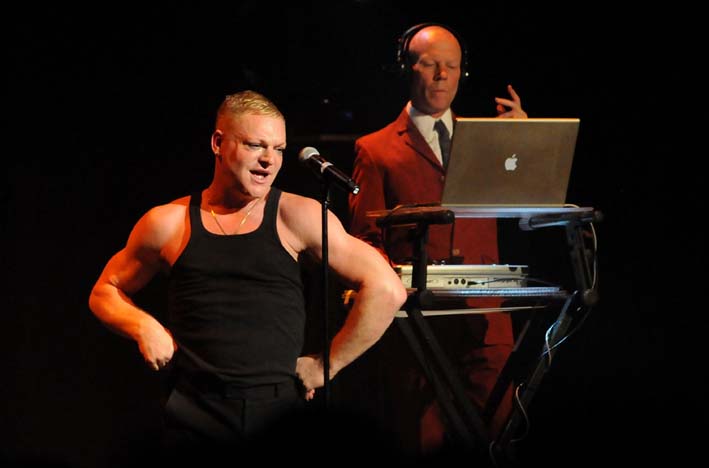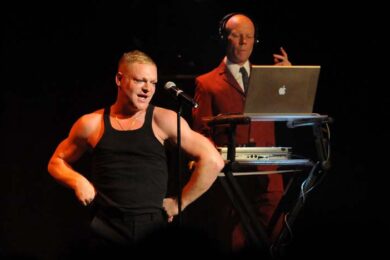When archaeologists are unable to easily rationalise the purpose of a structure, they’re often tempted to brand it "ritual" in purpose, assuming that the unexplainable must mean that it was built as part of the human desire to define the unexplained through architecture. One wonders what future explorers would make of the Roundhouse, with its perfect circular shape, iron columns soaring to the sky, and elongated pits at regular intervals in the floor, radiating from the centre like the empty tombs of dead giant knights. Surely they would fail to spot it were a former engine shed, the pits for clambering beneath the locomotives, and ascribe to it a mystical purpose? Since the late 70s, the Mute label has been a broad church for music that embraced, and embraces, the visionary and the charismatic, the sublime and the disturbing, the far-fetched and the escapist. And this church has attracted, as is abundantly evident over the course of the Short Circuit weekend, some fanatical disciples.
But first to Raster-Noton, the radical evangelical heirs to Mute’s early electronics-only ideology, who take over the Roundhouse for the Thursday night. The highlight for most is Alva Noto and Ryuichi Sakamoto’s premiere of their new album Summvs (read the Quietus interview about it here). Sakamoto sits at his piano stage left, Noto on the right, behind them is an intense oblong of light that shimmers like an iron filing sea, and when it hits a crescendo, burns the most vivid red. The piano and Noto’s bass and electronic flickers are never at odds with one another, instead coalescing – this music is somewhere between meditative and a feeling of unease in the back of your neck. Their final piece is a fine lament and a marvel of understated collaboration, the acoustic and electronic working in perfect harmony. Sadly most of the crowd now heads home.
Anne-James Chaton, actually a man in a nicely fitting suit, allows his own voice to be consumed and taken over by the digital. He delivers French at a frenetic pace, as if he were auctioning spider crab and sardines at La Rochelle quay, but his voice hits the resonance of the relentless, simple beats. It’s archly witty too – the second piece sculpts a beat out of "isdeadisdead", there’s a pause now and then for him to intone "the king of pop is dead" before the industrial babble once more takes over. It’s like a news report after something very, very bad has happened.
Atom TM is a similarly unsettling cove. Hair slicked back, shirt buttoned up, he stands between two screens. One of these features a projection of a pixelated blowjob (the first of two such films this weekend), while the other is a green and black readout of what’s happening on his synth. Atom TM wriggles and bobs strangely, between video pieces and slowly shuffles backwards out of view, like a figurine in a town clock.
And then Byetone, not merely the finest close to a night you could imagine, but one of the best live electronics performances I’ve ever seen. Drawing power from techno and industrial, Byetone’s set is not exactly what you want to hear in a politely seated venue. The textures on his beats are as smooth as they are hard and punishing – not for nothing is the best track on his Death Of A Typographer called ‘Plastic Star’, immense energy rendered tactile. But that isn’t even the best track dropped tonight in a set of pure, unrelenting power electronics gone pop. And so it ends, with the loop jointly created by Raster-Noton and Mute filling the Roundhouse until, the next day, Recoil pick it up…
Recoil is fine ferrous energy, playing in front of another screen full of collaged images: nuclear explosions, Soviet conductors – the sort of thing these people love. Best is footage of a wandering monk, set to music that might well be a Gil Scott Heron vocal part – it’s certainly a sight far more interesting than the vastly overrated Jamie XX reworking. The hints of Alan Wilder’s alma-mater Depeche Mode are received with an unhinged enthusiasm, and when Nitzer Ebb turn up to do a version of ‘Family Man’ and then ‘Personal Jesus’, the Roundhouse erupts. Over the balcony is hung a Russian flag, as if we’re at a football game, and on it is emblazoned the Mute logo and the words "from Russia with love". The Depeche Mode fans who’ve been hanging around outside the Roundhouse since late morning get what they’ve travelled across Europe to hear, and the atmosphere becomes one of glorious, unbridled celebration.
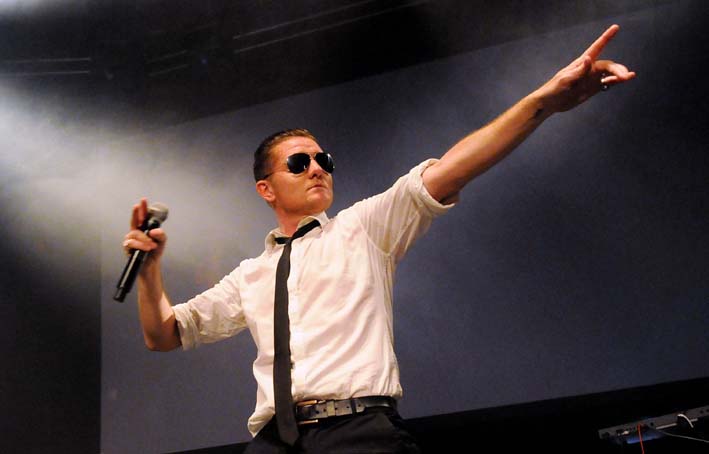
Nitzer Ebb’s own performance is as compelling as it is creepy. Douglas McCarthy, who with slicked hair and aviators looks a bad Terminator who got rejected for looking at mucky pictures, stomps about the stage as the drummers pound out a martial beat. Despite the fact that he’s spent the past two weeks hardly sleeping and clearing up the various emanations of his new-born son, m’colleague John Doran musters a fine hate-dance.
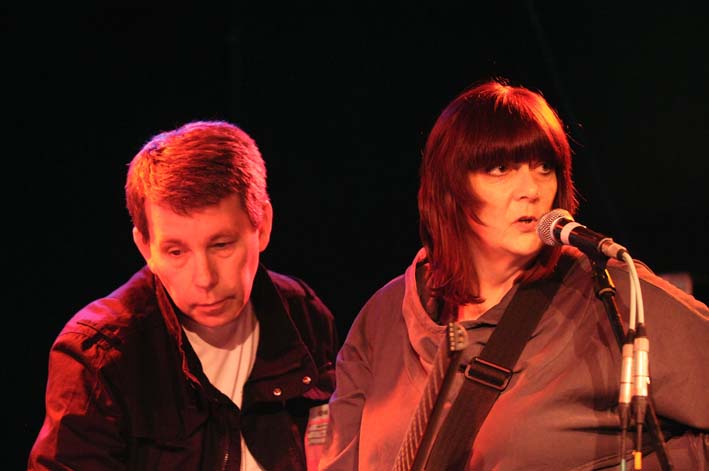
But most special of all is the collaboration between Carter Tutti and Nik Void of Factory Floor in the studio space nestled in the bowels of the Roundhouse. At their first performance in years at the ICA, which took place in February, Carter Tutti’s electronics were a warm embrace, creating a deep connection with the audience that made for one of the most wonderful atmospheres I’ve encountered at a live musical performance.
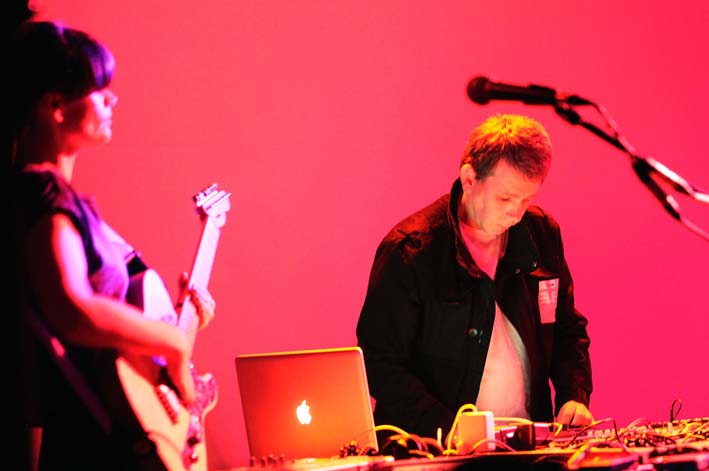
The same is true tonight, but in this tiny, packed room with an overpowering PA, it feels even more intense. The pulse at the core of their set is a very human heart. Anyone wary of Carter Tutti for the clichés that, over the years, have attached themselves to Throbbing Gristle, simply must endeavour to see them live at one of their rare performances. In this collaboration they are, as Factory Floor is, a perfect triangle: Carter at the back manipulates the electronics while on either flank, Void scratches noise with bowed guitar and Tutti plays while singing vocals that she mangles and distorts. The bass is tremendously heavy, and as the people move, they are moved. 2011 really does feel like a new beginning for Carter Tutti: there is no nihilism in this noise, nothing but a deep and wonderful sense of love.
After that it’s nigh-on impossible to get back into the small room for NON, Pole and Richard H. Kirk, a shame but Ritchie Hawtin plays a fine techno set upstairs in the main room. Down in the bar after that, there’s the strange sight of Daniel Miller DJing as people crowd round, not dancing but intent on what he’s doing. I hope that, as on his mix for the Quietus, he might have played Twinkle.
If Friday night was about a sense of collaboration, and experimentation, Saturday day features Quietus-hosted talks from producer Gareth Jones (a man whose talent is exceeded only by his humility) and the amusing Stefan Betke, aka Pole, who digs deep into the very particles of sound in a talk on mastering: "Burn your mp3s!" he exhorts. There’s also the Dirty Electronics session, where local young people get to build and perform with Mute synths, and Kriss Needs discusses the new Iain Forsyth & Jane Pollard film on The Bad Seeds’ The Boatman’s Call.
The music of the night session is a celebration of the breadth of the Mute church – not that all of the congregation see it that way. Liars, emboldened by the fantastic Roundhouse PA (one of the best I’ve encountered in London) play the heaviest thrash set I’ve yet seem them do, drawn largely from Quietus album of 2010 Sisterworld. It’s a shame there’s no new material, but it goes without saying that we’re eagerly anticipating what might come next.
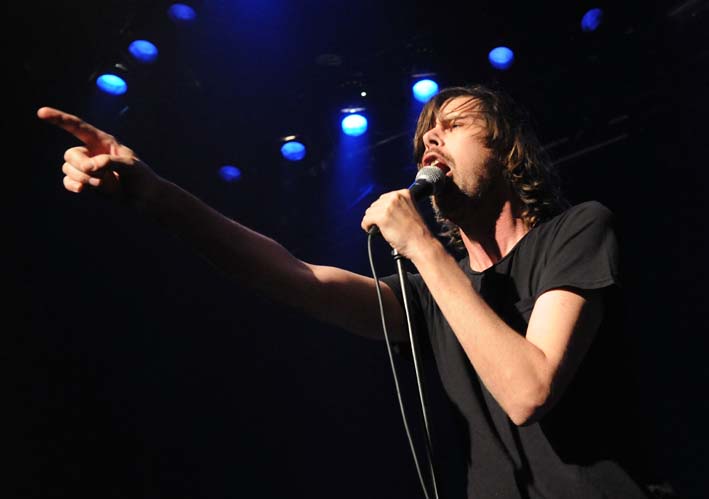
If Liars manage to annoy some of the Erasure fans crammed at the front, then it’s fair to say that The Residents make many apoplectic. Indeed, I’m even a little suspicious that Saturday’s bill might have been especially built to wind up the more fanatical synth monotheists in the Mute fanbase. For The Residents are a project designed to needle and provoke.
The Residents are a little ‘cabaret’, and arguably bit wacky, but if I am going to watch that sort of thing I’d rather it was done by a man called Randy (balding, creepy grandpops in clown shoes) and his two bandmates (basically Slipknot in sparkly jackets) playing low end noise, processed guitar shredding, and telling stories of ol’ American folks viewed through a sick and twisted prism. It is like a nightmare, though whether you find it like one of those high-grade stilton and wine-inspired nightmares that are actually quite exciting, or a sweaty horror seems tonight depend on whether or not you’re an Erasure or Yazoo fan waiting for Messrs Clarke, Bell and Moyet to come onstage. One group even hurls expletives and insults at the San Franciscan troupe.
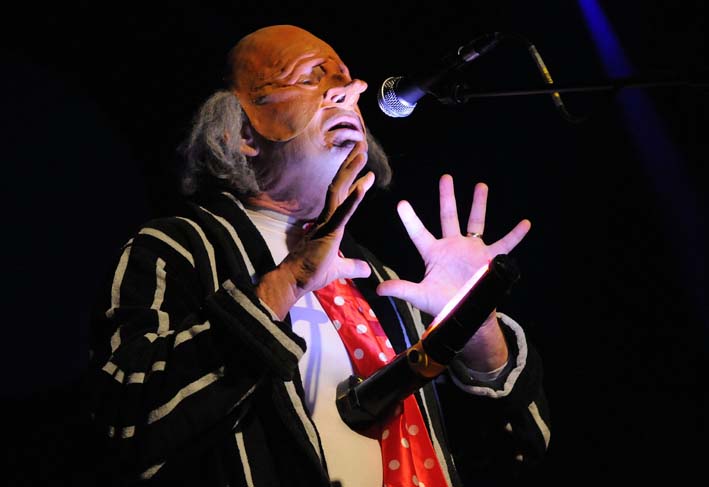
But for the more broadminded, this line-up actually makes perfect sense. In some ideal world, end of the pier entertainment would consist of cabaret from The Residents and joyous effervescent pop from Erasure. First, though, comes Vince Clarke (in an excellent salmon pink suit) and Alison Moyet’s final appearance together. They play the still sublime ‘Don’t Go’, which has many in tears and all dancing as a profoundly buff Andy Bell bounds on stage for a run-through of Erasure’s finest moments. It gets even better when Fergal Sharkey joins them for an assembly of The Assembly, and they sing a wonderful version of ‘Never Never’. It’s all evidence of just how far into pop Mute went while, at the same time, the likes of Neubauten and Nick Cave made music feral, narcotic and nocturnal. Even members of Laibach can be seen dancing at the back.
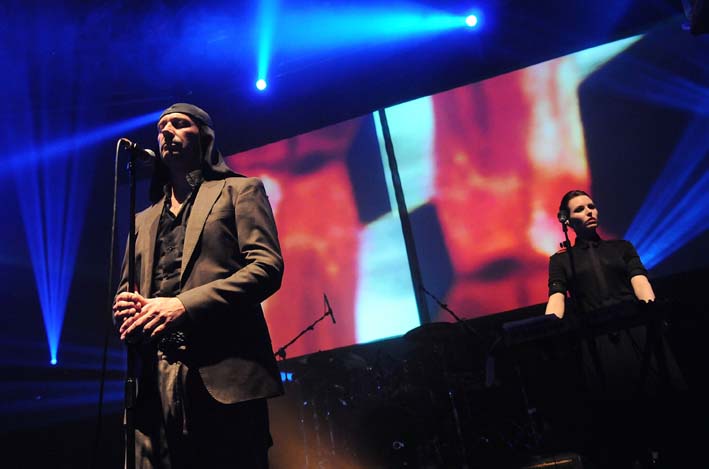
The NSK’s musical wing’s own set later on is deep and moody, and ends with a fantastic cover of ‘Warm Leatherette’, the track that started the Mute catalogue, all those years ago. And then it’s just left to Martin Gore to close the night with a DJ set. Which is when things get really weird. He stands behind his decks, playing an excellent set of techno that has, well, about 50 of us in the crowd dancing. But in front of him are stood hundreds of Depeche Mode enthusiasts, stock still, just filming him play records. They are clearly desperate for a Depeche Mode track… but, and full credit to Gore, he refuses. It’s a peculiar conclusion to a diverse, forward-thinking weekend that sees Mute regrouping and putting out feelers to the future after their departure from EMI. Oddly enough too, there’s a sense that the one person most sorely missed from the line-up is the late Frank Tovey of Fad Gadget. For it was his evolution from tar & feathered electronic art punk to guitar toting folk singer that perhaps best sums up Mute’s long journey to a label that now counts Beth Jeans Houghton and Big Deal, who play this weekend, among its ranks. Indeed, he also embraced Mute’s humour – there was a lot of light-hearted banter both onstage and in the talks that the Quietus hosted – in tracks like ‘Collapsing New People’, the satire on goths that actually featured Neubauten on drums. If only he had been present this weekend to deliver it to some of the crowd. I’m sure, though, he was thought of and quietly toasted by many, and present in spirit.
Who knows what a Mute Short Circuit in ten or twenty years might resemble: Nick Cave looking like Randy from The Residents? Andy Bell and Diamanda Galas dueting? Liars packing the room after everyone finally realises their genius? Perhaps Laibach will hold the presidency of the EU? Might there be a set from Factory Floor after the label finally signs them, realising that, in originality and ethos, they’re the contemporary artists closest to the Mute philosophy? There will certainly be DJ sets by members of Depeche Mode. I, for one, am looking forward to it already.

